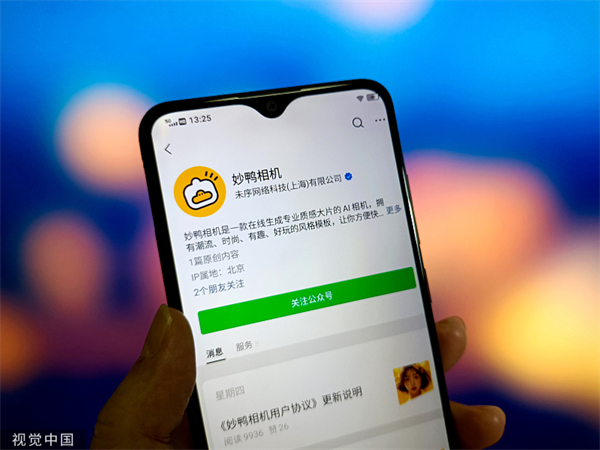
- Home
- Media Center
-
Events
- Wuzhen Summit
- Regional Forums
- Practice Cases of Jointly Building a Community with a Shared Future in Cyberspace
- World Internet Conference Awards for Pioneering Science and Technology
- The Light of Internet Expo
- Straight to Wuzhen Competition
- Global Youth Leadership Program
- WIC Distinguished Contribution Award
- Membership
- Research & Cooperation
- Digital Academy
-
Reports
- Collection of cases on Jointly Building a Community with a Shared Future in Cyberspace
- Collection of Shortlisted Achievements of World Internet Conference Awards for Pioneering Science and Technology
- Reports on Artificial Intelligence
- Reports on Cross—Border E—Commerce
- Reports on Data
- Outcomes of Think Tank Cooperation Program
- Series on Sovereignty in Cyberspace Theory and Practice
- Other Achievements
- About WIC
- 中文 | EN

AI portrait app latest social media craze; raises data security concerns

Miaoya Camera, a Chinese artificial intelligence portrait generator, swept across social media overnight with thousands of people lining up for an AI photo. [Photo/VCG]
As OpenAI's ChatGPT from the United States takes the tech world by storm, Miaoya Camera, a Chinese artificial intelligence portrait generator, swept across social media overnight with thousands of people lining up for an AI photo.
Industry experts said that it has become the country's first batch of applications using generative AI, the key technology behind ChatGPT, and it has also brought about problems for data security.
To get an AI portrait, users need to pay 9.9 yuan ($1.4) and upload at least 20 recent portraits to get a digital clone. Then, users can turn this digital clone into different types of portraits, such as identification photos, business photos or portraits using ancient Chinese styles.
Notably, users can train the artificial intelligence to make the portrait more like themselves, which industry experts said is the logic of generative AI, where a generative model can take what it has learned from examples to create something new.
The generator, which is currently a mini program on Tencent's social media platform WeChat, quickly attracted a large number of users wanting a photo. During peak hours, some users wait more than 15 hours to get a digital clone with over 6,000 users in the queue.
"The success of the AI portrait generator may be attributed to the low price while having similar quality photos compared with offline photo studios. Also, when generative AI delivers more tech advances, the portraits progress a lot in terms of personification and modification," said Wang Peng, a senior researcher at the Beijing Academy of Social Sciences.
According to a poll from lifestyle platform Xiaohongshu, 72 percent of users preferred the profile photo created by Miaoya Camera over one taken at Tianzhenlan, a major professional portrait photography chain.
Wang pointed out that the application was one of the first batches of successful generative AI applications on the consumer end, after a group of domestic companies launched large model applications mostly used by enterprises.
"It is too early to say that AI portraits will replace offline photo studios. Such applications haven't formed a clear business model, and are hard to get repeat payments from users after their first try," he added.
Data from database company Tianyancha show that Miaoya was incubated from online video platform Youku and was backed by leading tech company Alibaba Group.
As the portrait application becomes more popular, a concern surrounding data security has also arisen. Users questioned the company's previous user agreement saying that it enables the company to use the content in any form, in any media or technology. Later, the company changed its agreement saying that the photos they upload will solely be used for creating digital clones.
"With the rising application of generative AI large models, data security problems arise such as illegal data acquisition, data leakage and malicious abuse of data. How to fasten the seat belt for generative AI development has become increasingly important," said Zhang Tianyi, senior product manager of RealAI, a Tsinghua University-backed Beijing-based AI security company.
"Abusing content generated by large models may lead to content compliance issues, including deceptive content generated by deep fakes and diffusion models, which will give users incorrect guidance and may cause bad social influence," she added.

The World Internet Conference (WIC) was established as an international organization on July 12, 2022, headquartered in Beijing, China. It was jointly initiated by Global System for Mobile Communication Association (GSMA), National Computer Network Emergency Response Technical Team/Coordination Center of China (CNCERT), China Internet Network Information Center (CNNIC), Alibaba Group, Tencent, and Zhijiang Lab.





